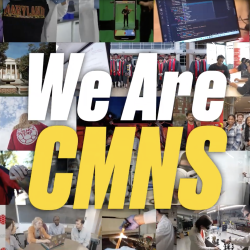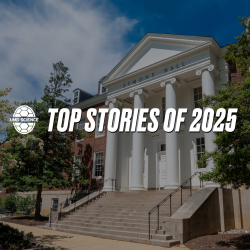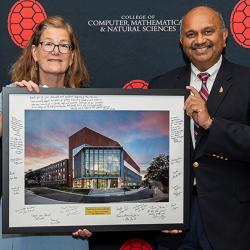Baritone, Brownies and Biochemistry
Senior biochemistry major Emma Neiswender’s passion for problem-solving led her to excel in lab research and community-building at UMD.
Growing up in Carroll County, Maryland, Emma Neiswender always loved puzzles. As she got older, Neiswender learned that her passion for puzzles could help her succeed at both school and her hobbies.
Her meticulous and investigative approach to music made her a better baritone player in her marching band. At home, that same problem-solving ability made her a better baker. And in her classes, she quickly realized that her affinity for intricate puzzles gave her a unique talent for solving complex math problems.

“I grew up in a pretty rural area that didn’t really expose me to STEM until later into my childhood,” Neiswender recalled. “But I’ve always liked puzzles and things that made me think analytically, including music and baking—so it makes sense that I was a math kid. To me, math was a big puzzle that I had to figure out.”
In high school, Neiswender’s teachers introduced her to the complexities of physics and chemistry. These subjects required her to work through problems by trying to fit things together using logic and reasoning. Just as she used her problem-solving skills in music and baking, Neiswender applied her talent to chemistry and instantly fell in love with the field. By the time she graduated from high school, Neiswender knew that she wanted to continue.
“My teachers, family and friends really inspired me to take my skills to the next level,” said Neiswender, who is now a senior biochemistry major at the University of Maryland. “It just made sense for me to choose UMD and its chemistry program—it’s academically rigorous, close to home, and provides a great balance between academic research and a life outside of the classroom.”
Building bonds and solving problems
When Neiswender arrived at UMD in 2020, she quickly took on an active role in the Department of Chemistry and Biochemistry, as both an aspiring researcher and a community leader.
Neiswender currently works in Associate Professor Jason Kahn’s lab, which studies the structure, function and design of protein-DNA complexes, or protein structures that hold DNA together within chromosomes. Along with biochemistry Ph.D. student Ian Ferencz, she uses S. cerevisiae (commonly known as brewer’s or baker’s yeast) to develop and test methods that increase efficiency in gene editing.
“We’re using a DNA looping protein to tether DNA closer together within a cell, which we propose will make the gene editing process a lot more efficient,” Neiswender explained. “Gene editing is already in so many fields, such as agriculture and medicine. It can cure sickle cell disease or certain cancers. Improving the process can really change people’s lives.”
Kahn, who oversees the collaboration between Ferencz and Neiswender, noted that Neiswender’s exceptional organizational and time management skills were essential to the research’s progress.
“Since Emma joined my lab, she’s rapidly made herself indispensable and is a full partner in the project she’s working on with Ian,” Kahn said. “The two of them have taught me everything I know about practical yeast genetics. I look forward to seeing her advance to medical school.”
Outside the lab, Neiswender is especially passionate about fostering a warm, tightly knit community for her peers and providing the same kind of support she received as a young STEM student. As an executive board member of Alpha Chi Sigma, UMD’s only professional chemistry fraternity, she helps plan events to help bring students, staff, faculty and the broader chemistry community together.
“Having support and knowing that you aren’t facing challenges by yourself is really important, whether it’s class content, exams, career prospects or just personal struggles,” Neiswender said, recalling how her own friends and teachers encouraged her to succeed even during tough times. “Building connections and learning about other perspectives and experiences, especially from people who have accomplished what you want to accomplish, can really make a difference in the long run.”

Neiswender also brings something else to Alpha Chi Sigma’s community-building events—her passion for baking. She bakes pastries for the breakfasts that the fraternity hosts for faculty members. And she takes her baking as seriously as her scientific work.
“My approach to baking isn’t really that different from how I handle my research,” Neiswender said. “All my pastries are baked from scratch and based on my own recipes. My friend actually called my most recent batch of brownies ‘analytical chemistry brownies’ because I spent almost eight months on the recipe, tweaking it until the brownies were exactly the way I wanted the end product to be.”
After she graduates in May 2024, Neiswender hopes to take her puzzle-solving skills to the National Institutes of Health as a post-baccalaureate to gain more research experience before going to medical school. Looking ahead, she sees a career as a trauma surgeon—and more baking adventures—in her future.
“I love the idea of having new things to do every day, not just running through a set list repeatedly,” Neiswender explained. “Whether it’s learning a better technique for cake decorating or performing an experiment, I’m always looking for a new challenge.”






